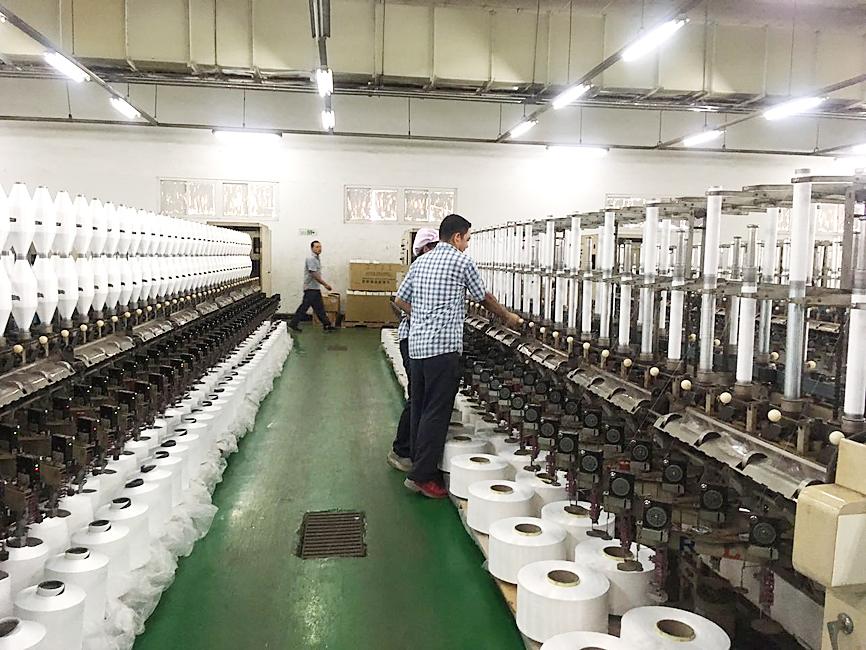The climate gauge for the nation’s manufacturing sector in September remained “yellow-red” for the fifth consecutive month, reflecting fast growth, even though port congestion and supply chain disruptions posed uncertainty and drove up operational costs, the Taiwan Institute of Economic Research (TIER, 台經院) said yesterday.
The composite index for the manufacturing sector fell 0.21 points to 16.27 from August, as power rationing and emission restrictions in China slightly weighed on input activity, but the index remained just inside the “yellow-red” range of 16 to 18.5 points, the Taipei-based institute said.
EVERGRANDE WOES

Photo: Chen Rou-chen, Taipei Times
While cash woes plaguing Chinese property developer China Evergrande Group (恆大集團) also dampened sentiment, share prices of electronics, machinery equipment and telecommunication companies picked up, lending support to the overall score, it said.
The institute uses a five-color system to gauge manufacturing activity, with “blue” suggesting recession, “yellow-blue” a slowdown, “green” stability, “yellow-red” fast growth and “red” overheating.
It was the seventh month this year that the manufacturing sector reported a yellow-red reading, the institute said.
Among the five components in the composite index, the sub-index on the operating environment gained 0.38 points, while selling prices were flat, as the peak season might be over for some sectors with correction pressure building, it said.
The input measure lost 0.29 points and the cost tracker shed 0.01 points, it added.
The reading for industries supplying essential goods, such as textile products, was yellow-red, although lockdowns in Vietnam caused supply chain disruptions, it found.
Most Taiwanese textile companies operate manufacturing facilities in Vietnam to save on production costs.
Strong exports pushed up demand for cardboard boxes, causing their prices to increase, the institute said.
The measure also turned yellow-red for manufacturers of petrochemical and plastic products, supported by soaring crude and oil product prices, it said.
However, container shortages and port bottlenecks abroad have delayed their input schedule, it added.
Base metal suppliers reported double-digit percentage growth in business as they continued to benefit from increasing infrastructure spending in the US and Europe, the institute said, adding that machinery equipment vendors were less impressive, reporting steady sales.
Business at electronic component providers remained robust on the back of new product launches and insatiable demand for 5G technology and Internet of Things applications, the institute said.
PENT-UP DEMAND
Auto parts suppliers reported price hikes amid pent-up demand for vehicles, but port congestion and a global chip shortage stretched delivery times, causing the vehicle market in China to slow down, which has turned the reading for related sectors in Taiwan to yellow-blue, it said.

MULTIFACETED: A task force has analyzed possible scenarios and created responses to assist domestic industries in dealing with US tariffs, the economics minister said The Executive Yuan is tomorrow to announce countermeasures to US President Donald Trump’s planned reciprocal tariffs, although the details of the plan would not be made public until Monday next week, Minister of Economic Affairs J.W. Kuo (郭智輝) said yesterday. The Cabinet established an economic and trade task force in November last year to deal with US trade and tariff related issues, Kuo told reporters outside the legislature in Taipei. The task force has been analyzing and evaluating all kinds of scenarios to identify suitable responses and determine how best to assist domestic industries in managing the effects of Trump’s tariffs, he

TIGHT-LIPPED: UMC said it had no merger plans at the moment, after Nikkei Asia reported that the firm and GlobalFoundries were considering restarting merger talks United Microelectronics Corp (UMC, 聯電), the world’s No. 4 contract chipmaker, yesterday launched a new US$5 billion 12-inch chip factory in Singapore as part of its latest effort to diversify its manufacturing footprint amid growing geopolitical risks. The new factory, adjacent to UMC’s existing Singapore fab in the Pasir Res Wafer Fab Park, is scheduled to enter volume production next year, utilizing mature 22-nanometer and 28-nanometer process technologies, UMC said in a statement. The company plans to invest US$5 billion during the first phase of the new fab, which would have an installed capacity of 30,000 12-inch wafers per month, it said. The

Taiwan’s official purchasing managers’ index (PMI) last month rose 0.2 percentage points to 54.2, in a second consecutive month of expansion, thanks to front-loading demand intended to avoid potential US tariff hikes, the Chung-Hua Institution for Economic Research (CIER, 中華經濟研究院) said yesterday. While short-term demand appeared robust, uncertainties rose due to US President Donald Trump’s unpredictable trade policy, CIER president Lien Hsien-ming (連賢明) told a news conference in Taipei. Taiwan’s economy this year would be characterized by high-level fluctuations and the volatility would be wilder than most expect, Lien said Demand for electronics, particularly semiconductors, continues to benefit from US technology giants’ effort

In a small town in Paraguay, a showdown is brewing between traditional producers of yerba mate, a bitter herbal tea popular across South America, and miners of a shinier treasure: gold. A rush for the precious metal is pitting mate growers and indigenous groups against the expanding operations of small-scale miners who, until recently, were their neighbors, not nemeses. “They [the miners] have destroyed everything... The canals, springs, swamps,” said Vidal Britez, president of the Yerba Mate Producers’ Association of the town of Paso Yobai, about 210km east of capital Asuncion. “You can see the pollution from the dead fish.